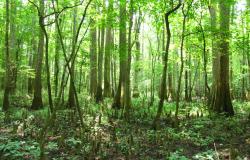
Scientists believe that humanity has already crossed the core planetary boundary for climate change, and is closer to crossing thresholds that trigger abrupt and irreversible environmental changes. Consequently, academia and the international political community should not disregard the prospect of a catastrophic environmental event. However, discussions about climate change usually assume the resilience of potentially deteriorating terrestrial‐biosphere carbon sinks and rarely acknowledge catastrophic climate risk. Reviewing the latest scientific evidence on anthropogenic climate change, as well as the current and projected threats to the resilience of key large forest biomes, and combining them with the profound political frailties of the Paris Climate Agreement, this article argues that catastrophic climate risk is much more serious and likely than most of humanity is able to perceive and should thus be seriously considered. It emphasizes the massive gap between science and political action and how cognitive, cultural, institutional, and political limitations hinder our capacity to envisage, prevent, and ultimately manage catastrophic climate change. The article concludes by briefly raising awareness regarding the role that academia should play in catastrophic climate risk reduction.
Policy Implications
- Consistent social science research on catastrophic climate change (CCC) and forest tipping points could promote more advanced modelling and assessment by the IPCC, which would be very relevant for developing a more enlightened and robust global climate policy.
- Given the extreme complexity of the problem and the strong difficulties in drawing attention to long‐term risks, communicating CCC to the global elites and mass public is a very challenging task. Consequently, the UNFCCC should promote innovative social science research on the challenges with and opportunities in dealing with the problem.
- The most important climate science communities – the USA, Canada, the European Union, Japan, China, India, Russia, Brazil, and Mexico – should create a forum for promoting advanced cooperative research on CCC.
- A greater focus on boreal forests’ carbon stocks in international political fora is essential for averting CCC.
- Raising awareness among the social science community about the urgent need for research on the relationship between CCC and the dieback of the Amazon rainforest will have a beneficial impact on the national climate policies of the Amazonian countries, as well as on the Amazon Cooperation Treaty Organization (ACTO).